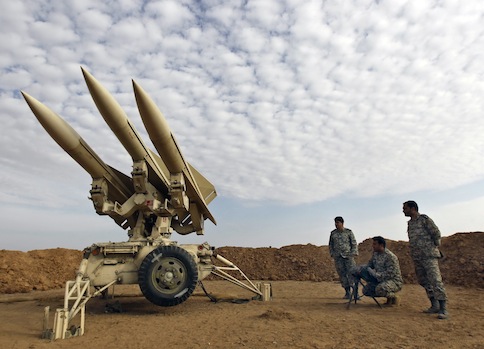The White House on Monday pushed back against Iran’s efforts to set a "red line" preventing negotiations over its contested ballistic missile program, which has been permitted to continue undeterred under the recently signed interim nuclear accord.
One of Iran’s top nuclear negotiators stated early Monday that Iran would under no circumstances negotiate with the West on its ballistic missile program. These remarks were accompanied by the announcement that Tehran had successfully test fired two ballistic missiles, which are the preferred delivery system for nuclear arms.
"The defense-related issues are a red line for Iran," Abbas Araqchi, Iran’s senior negotiator and its deputy foreign minister, was quoted as saying on Monday, just a week before talks are set to resume. "We will not allow such issues to be discussed in future talks."
However, the White House quickly pushed back against the comments, vowing to force the issue during upcoming negotiations and demand that it be resolved under a final deal.
"Per the Joint Plan of Action, Iran must address the [United Nations] Security Council resolutions related to its nuclear program before a comprehensive resolution can be reached," Bernadette Meehan, National Security Council spokesperson, told the Washington Free Beacon.
"Among other things, UN Security Council Resolution 1929 prohibits all activities involving ballistic missiles capable of delivering nuclear weapons, including launches," Meehan said. "So this issue will need to be addressed during the comprehensive discussions."
This is one of the first instances of the White House publicly pushing back against Iran’s demands, which have grown increasingly bellicose as the talks proceed.
Iran is on course to develop more advanced ballistic missiles, the country’s defense minister was quoted as saying following Monday’s test.
"The new generation of ballistic missile with a fragmentation warhead, and a Bina laser-guided surface-to-surface and air-to-surface missile, have been successfully tested," Defense Minister Hossein Dehgan was quoted as saying in numerous reports.
Under new Iran sanctions legislation currently stalled in Congress, Iran would have been subject to immediate and harsh economic penalties for launching a ballistic missile.
Wendy Sherman, the U.S.’s top negotiator, admitted during a congressional hearing last week that Iran can continue its ballistic missile work under the interim nuclear deal, which will last for around six months.
"It is true that in these first six months we’ve not shut down all of their production of any ballistic missile that could have anything to do with delivery of a nuclear weapon," Sherman told lawmakers during a hearing on the nuclear deal. "But that is indeed something that has to be addressed as part of a comprehensive agreement."
Sherman’s admission elicited concern from several senators.
"Why did you all not in this agreement in any way address the delivery mechanisms, the militarizing of nuclear arms, why was that left off since they [Iran] breached a threshold everyone acknowledges. They can build a bomb. We know that," said Sen. Bob Corker (R., Tenn.), the committee’s ranking member. "They know that. They have advanced centrifuges. We have a major loophole in the research and development area that everyone acknowledges."
